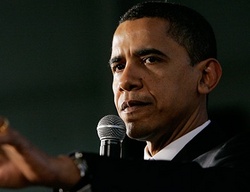 From President Obama’s speech at the University of Michigan…
From President Obama’s speech at the University of Michigan…
Today’s 24/7 echo-chamber amplifies the most inflammatory soundbites louder and faster than ever before. And it’s also, however, given us unprecedented choice. Whereas most Americans used to get their news from the same three networks over dinner, or a few influential papers on Sunday morning, we now have the option to get our information from any number of blogs or websites or cable news shows. And this can have both a good and bad development for democracy. For if we choose only to expose ourselves to opinions and viewpoints that are in line with our own, studies suggest that we become more polarized, more set in our ways. That will only reinforce and even deepen the political divides in this country.But if we choose to actively seek out information that challenges our assumptions and our beliefs, perhaps we can begin to understand where the people who disagree with us are coming from. Now, this requires us to agree on a certain set of facts to debate from. That’s why we need a vibrant and thriving news business that is separate from opinion makers and talking heads. (Applause.) That’s why we need an educated citizenry that values hard evidence and not just assertion. (Applause.) As Senator Daniel Patrick Moynihan famously once said, “Everybody is entitled to his own opinion, but not his own facts.” (Laughter.)Still, if you’re somebody who only reads the editorial page of The New York Times, try glancing at the page of The Wall Street Journal once in a while. If you’re a fan of Glenn Beck or Rush Limbaugh, try reading a few columns on the Huffington Post website. It may make your blood boil; your mind may not be changed. But the practice of listening to opposing views is essential for effective citizenship. (Applause.) It is essential for our democracy. (Applause.)And so, too, is the practice of engaging in different experiences with different kinds of people. I look out at this class and I realize for four years at Michigan you have been exposed to diverse thinkers and scholars, professors and students. Don’t narrow that broad intellectual exposure just because you’re leaving here. Instead, seek to expand it. If you grew up in a big city, spend some time with somebody who grew up in a rural town. If you find yourself only hanging around with people of your own race or ethnicity or religion, include people in your circle who have different backgrounds and life experiences. You’ll learn what it’s like to walk in somebody else’s shoes, and in the process, you will help to make this democracy work. (Applause.)
Here’s a really good example: The Anti-Me.
What do you think?

